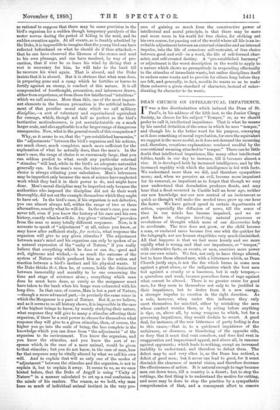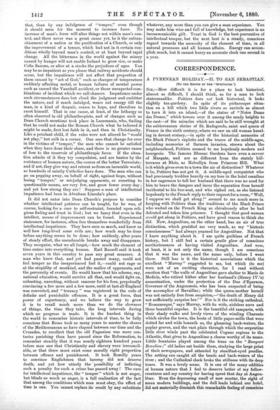DEAN CHURCH ON INTELLECTUAL IMPATIENCE.
IT was a fine discrimination which induced the Dean of St. Paul's, in his address of the 12th inst. to the Junior Clergy Society, to choose for his subject " Temper," or, as we should prefer to call it, intellectual impatience. That is what he means by his careful definition of the sense in which he uses " temper," and though his is the better word for his purpose, conveying as it does something of moral reprobation, for ours the equivalent we suggest is the more useful, as it does not demand the recurring and, therefore, vexatious explanations rendered needful by the conventional meaning attached to " temper." There can be little doubt that intellectual impatience, like many other intellectual foibles, tends in our day to increase, till it becomes almost a vice. It is developed both by increased intelligence, and by the increased rapidity with which the intelligence is fed with facts. We understand more than we did, and therefore sympathise more; and, when we perceive an evil, become more impatient for its removal, so impatient as to forget that though we may now understand that denudation produces floods, and may bear that a flood occurred in Castile half an hour ago, neither our new knowledge nor our new control of an instrument as quick as thought will make the needed trees grow up one hour the faster. We have gained speed in certain departments of action, especially the diffusion of news, till the sense of time in our minds has become impaired, and we ex- pect haste in changes involving natural processes or revolutions of thought which none of our discoveries help to accelerate. The tree does not grow, or the child become a man, or enslaved races become free one whit the quicker for the telegraph, nor are human stupidities very much diminished. All that happens is that we feel more keenly and see more rapidly what is wrong, and that our impatience, or " temper," with obstructive facts, or events, or men, exercises more power over our own minds. We fret, not only to have things altered, but to have them altered now, with a bitterness which, as Dean Church justly says, is not the fire which burns in some men against a great abuse, or the indignation which the best men feel against a cruelty or a baseness, but is only temper,— a querulous and weak, because powerless form of rage against what cannot be altered. There is no greater snare for good men, for they seem to themselves not only to be justified in their impatience, but to derive from it a new energy, a stronger impulse to exertion in the right direction. As a rule, however, when under this influence they only exert themselves for mischief, either by mistaking the men whose conduct worries them, or by acting before anything is ripe, or, above all, by using weapons to which, but fox a governing impatience, they would disdain to resort. A good deal, for instance, of the new bitterness of party feeling is due to this cause,—that is, to a quickened impatience of the unfairness, or slowness, or blundering of the opposite side, so fiery that it must find vent somehow, and does find vent in exaggeration and impassioned appeal, and above all, in rancour against opponents ; which leads to nothing, except an increased inability to understand, and therefore to defeat them. The defect may be and very often is, as the Dean has noticed, a defect of good men; but it never can lead to good, for it must diminish the clearness of mental vision, and therefore decrease the effectiveness of action. It is natural enough to rage because men cut down trees, till a country is a desert; but to stop the cuttings, the first thing is to understand the motive for cutting, and more may be done to stop the practice by a sympathetic comprehension of that, and a consequent effort to remove
that, than by any indulgence of " temper," even though it should seem for the moment to increase force. No increase of man's force will alter things not within man's con- trol, and there never was a great cause yet, be it the enfran- chisement of a nation or the purification of a Church, or only the improvement of a tenure, which had not in it certain con- ditions wholly beyond man's control, or at least beyond rapid change. All the bitterness in the world against the misery caused by hunger will not enable Ireland to grow rice, or make Celts Saxons, or alter at a stroke the prejudices of ages. You may be as impatient as you please that railway accidents should occur, but the impatience will not affect that proportion of them caused by "act of God," such as changes of temperature suddenly affecting metal, or human failures of mental power such as caused the Vauxhall accident, or those unexpected com- binations of incident which we call chances. Impatience under such circumstances does but cloud the judgment and embitter the nature, and if much indulged, wears out energy till the man, in a kind of despair, ceases to hope, and therefore to exert himself. That is one cause, at least, of the lethargy so often observed in old philanthropists, and of changes such as Dean Church mentions took place in Lamennais, who, finding that be could not make the Roman Church what he believed it might be made, first lost faith in it, and then in Christianity. Like a petulant child, if the rules were not altered be "would not play," but sulk in a corner. One sees that change for ever in the victims of "temper," the men who cannot be satisfied when they have done their share, and there is no greater cause of loss to the reservoir of philanthropic force. If the situa- tion admits of it they try compulsion, and are beaten by the resistance of human nature, the course of the better Terrorists ; and if not, they give way and retreat as from an incurable world, as hundreds of saintly Catholics have done. The men who can go on pegging away, on behalf of right, against hope, without losing "temper," or misjudging opponents, or resorting to questionable means, are very few, and grow fewer every day ; and yet how strong they are ! Suppose a man of intellectual impatience had been in Abraham Lincoln's place.
It did not enter into Dean Church's purpose to consider whether intellectual patience can be taught, for he was, of course, looking for a cure to self-restraint, founded upon reli- gious feeling and trust in God ; but we fancy that even in the intellect, means of improvement ran be found. Experienced statesmen, for instance, often free themselves wonderfully from intellectual impatience. They have seen so much, and know so well how long-lived some evils are ; how much may be done before anything seems to be done ; how suddenly, after years of steady effort, the unendurable breaks away and disappears. They recognise, what we all forget,—how much the element of time enters into everything human. Earl Russell said it took seven years in this country to pass any great measure. A man who knew that, and yet had passed many, could not feel temper as the inexperienced feel it,—could not rage so at the stupidity of mankind, and the malice of opponents, and the perversity of events. He would know that his scheme, say, national education, would survive all that, and would fight on, unhaating, unresting, without rancour for his foes, perpetually convincing a few more and a few more, until at last all England was converted, and " truancy " was registered in the code of definite and punishable offences. It is a great force, that power of expectancy, and we believe the way to grow it is to recall much more than we do the slowness of things, the time they take, the long intervals during which no progress is made. It is the hardest thing in the world to remember historic intervals of time, to be fully conscious that Rome took as many years to master the shores of the Mediterranean as have elapsed between our time and the Crusades, to recollect that the old Paganism was more cen- turies perishing than have passed since the Reformation, to remember steadily that it was nearly eighteen hundred years before men saw that Christianity and slavery were irreconcil- able, or that there must exist some morally right proportion between offence and punishment. It took Romilly years to convince Englishmen that larceny did not deserve death, and yet how utterly the • possibility of inflicting such a penalty for such a crime has passed away ! The cure for intellectual impatience, the " temper " which is not anger, but blinds as much as anger, is a full realisation of the fact that among the conditions which man must obey, the effect of time is one. You cannot replace its result by any substitute
whatever, any more than you can give a man experience. Yoa may make him wise and full of knowledge, but experience is an incommunicable gift. Trust in God h the best preventive of intellectual temper, but the next best is a steady, conscious regard towards the necessity of the element of time, in all natural processes and all human affairs. Energy can accom- plish much, but it cannot hurry an accurate clock one second in a year.



































 Previous page
Previous page